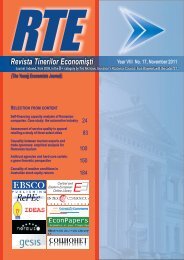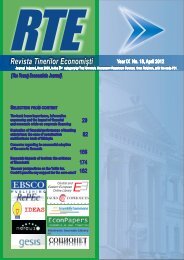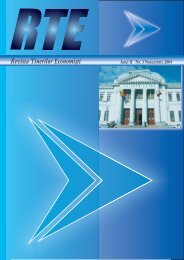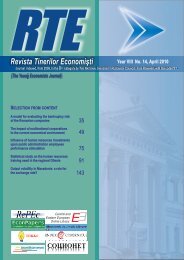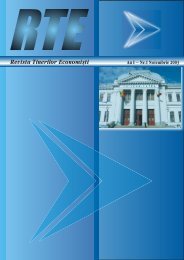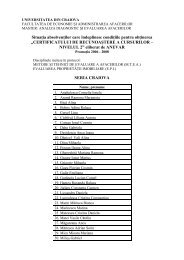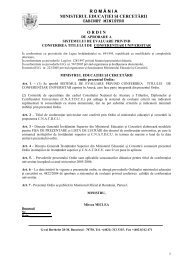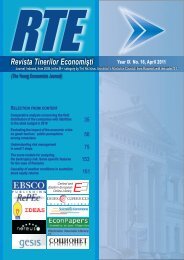Implications of change management in public administration
Implications of change management in public administration
Implications of change management in public administration
You also want an ePaper? Increase the reach of your titles
YUMPU automatically turns print PDFs into web optimized ePapers that Google loves.
Revista T<strong>in</strong>erilor Economişti (The Young Economists Journal)<br />
<strong>in</strong> a SME, and also the theoretical aspects exposed <strong>in</strong> the first part <strong>of</strong> the paper, we will<br />
try to identify some aspects regard<strong>in</strong>g the use <strong>of</strong> group decisions <strong>in</strong> the Romanian<br />
SMEs (rather prerequisites and barriers).<br />
The first direction <strong>of</strong> study aims at draft<strong>in</strong>g the characterization <strong>of</strong> the<br />
Romanian owner-manager, and identify<strong>in</strong>g those qualities which could <strong>of</strong>fer us some<br />
clues <strong>in</strong> terms <strong>of</strong> his position towards the group decisional process.<br />
Silviu Hotăran, ex-CEO <strong>of</strong> Micros<strong>of</strong>t Romania, presently general manager <strong>of</strong><br />
GKTI Semper Human makes the follow<strong>in</strong>g statements: “I believe that lack <strong>of</strong> trust is a<br />
„chronic disease‟ <strong>in</strong> the entire Romanian society, <strong>in</strong>dividualism, the <strong>in</strong>ability to delegate<br />
and to work <strong>in</strong> team is, unfortunately, the elements <strong>of</strong> the <strong>management</strong> culture <strong>in</strong> our<br />
country. In this context, many Romanian companies suffer from the syndrome „one<br />
man show‟, where the control is held by only one person who controls the access to<br />
<strong>in</strong>formation <strong>in</strong>stead <strong>of</strong> delegat<strong>in</strong>g and limits the company growth. This syndrome<br />
appears firstly at entrepreneurs, those who started the bus<strong>in</strong>ess by themselves. In their<br />
behavior one can observe the lack <strong>of</strong> trust. In the case <strong>of</strong> the one who had courage and<br />
<strong>in</strong>vested <strong>in</strong> the bus<strong>in</strong>ess (the entrepreneur), lack <strong>of</strong> trust can <strong>in</strong>crease especially <strong>in</strong> times<br />
<strong>of</strong> „storm„” (www.pr<strong>of</strong>esiionl<strong>in</strong>e.ro).<br />
The same entrepreneur adds: “Beyond the syndrome „one man show‟ which<br />
characterizes the Romanian entrepreneur who started do<strong>in</strong>g bus<strong>in</strong>ess <strong>in</strong> the ‟90 and who<br />
has not courage to delegate, Romanian managers do not know how to communicate and<br />
they forget that the most important aspect <strong>of</strong> communication is listen<strong>in</strong>g. We do not<br />
know how to motivate people and to self-motivate, we focus on what does not function<br />
and we forget to appreciate the th<strong>in</strong>gs done well. We do not know to give and receive<br />
feedback or to say when problems occur and we postpone them. Someone work<strong>in</strong>g at<br />
Micros<strong>of</strong>t said „problems do not age <strong>in</strong> a beautiful way‟. We do not know how to trust<br />
someone. These are not specific only to Romanian managers, but <strong>in</strong> Romania they are<br />
exaggerated.” (www.pr<strong>of</strong>esiionl<strong>in</strong>e.ro)<br />
Unfortunately, this po<strong>in</strong>t <strong>of</strong> view is not s<strong>in</strong>gular. “I believe that 99% <strong>of</strong> the<br />
entrepreneurs and managers <strong>of</strong> Romania do not have a clear system <strong>of</strong> delegation, not<br />
because they were not capable but because they don not have the skills levels<br />
established for the company. We are <strong>in</strong> a worse situation than our neighbors. Unlike<br />
Romania, <strong>in</strong> the neighbor countries there is a procedure and standardization culture<br />
which force people to establish tasks, responsibilities, objectives and competency<br />
limits”, considers Petre Nicolae, general manager <strong>of</strong> CBC Romania, consultancy and<br />
strategic <strong>management</strong> company (www.bus<strong>in</strong>essstandard.ro).<br />
“The pathological distrust (everybody steals from me) and the impression that<br />
they know everyth<strong>in</strong>g better than anyone determ<strong>in</strong>e the managers to become the first<br />
obstacle for their bus<strong>in</strong>ess”, says Octavian Radu, founder and president <strong>of</strong> the RTC<br />
group (www.bus<strong>in</strong>essstandard.ro).<br />
Return<strong>in</strong>g to the theoretical elements, it is considered that, for the majority <strong>of</strong><br />
the SMEs, the first years <strong>of</strong> function<strong>in</strong>g require a micro-<strong>management</strong> and manager‟s<br />
total <strong>in</strong>volvement <strong>in</strong> the current problems even <strong>in</strong>significant ones (Mazzarol, 2003). In<br />
the first years, companies are dependent <strong>of</strong> their owner-manager <strong>in</strong> order to survive. As<br />
far as the bus<strong>in</strong>ess grows, the owner-manager must build a team <strong>management</strong> with<br />
whom to consult and learn to delegate. Formicheli (1997) notifies the danger <strong>of</strong> nano<strong>management</strong><br />
and the risk that the owner cannot give up the specific (and necessary)<br />
<strong>management</strong> style <strong>in</strong> the first stages <strong>of</strong> a small bus<strong>in</strong>ess.<br />
102



